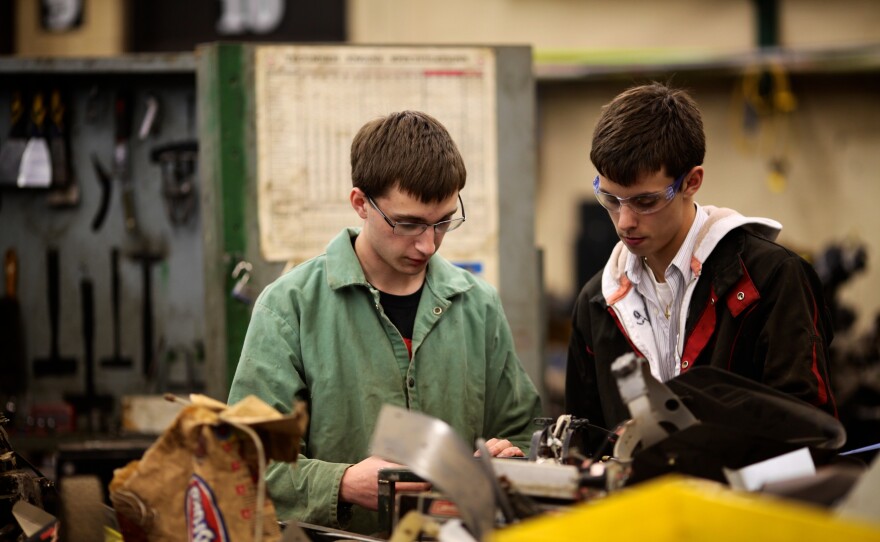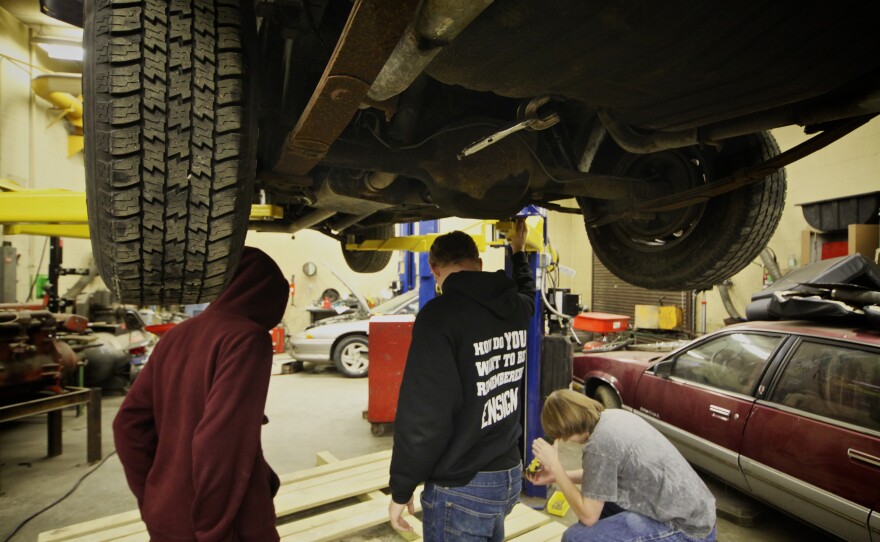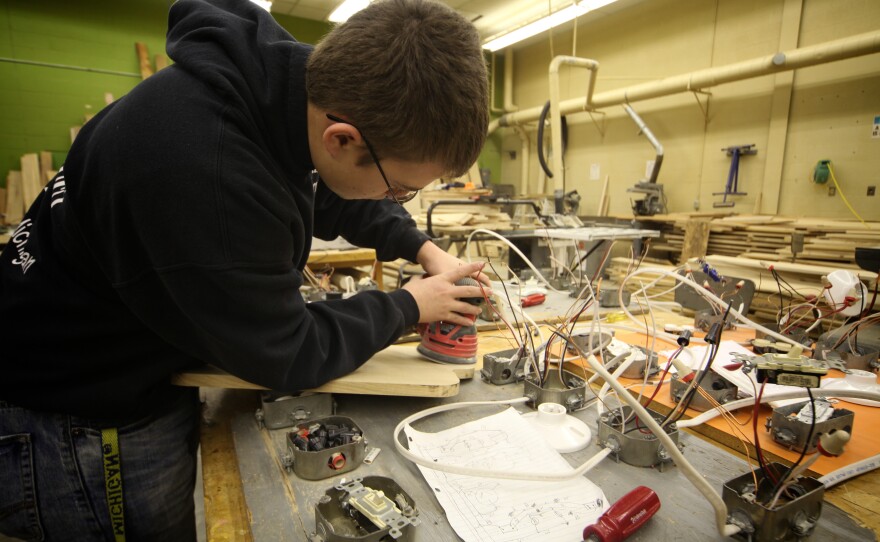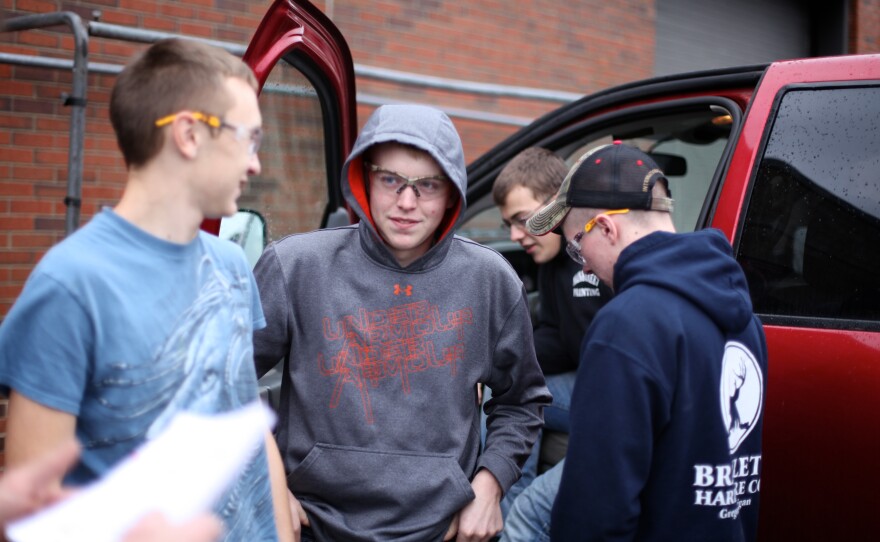The schools in Stockbridge, Michigan have in some ways a sad task in educating their youth. Because Stockbridge is a rural village with very little economic opportunity preparing kids to succeed often means preparing them to leave town.
Teachers and administrators at the high school there don't think it's enough to try to prepare thier students for college. College is expensive, and though most of the kids will pursue higher education of one kind or another, paying for it can be tough.
So teacher Duane Watson and a few others are heavily invested in technical education. Watson has three rooms he teaches in, to call them classrooms might give the wrong impression. In one of them, the only desks are broken ones people hope his students will fix.
It's a garage and I was impressed that three full cars could fit in it before Watson corrected me.
“Four actually, and one compact utility tractor, a snowplow going on a truck, a completely student fabricated tandem-axle trailer, and an alternative fuel vehicle-a battery powered golf cart." He said as he laughed about the golf cart experiment.
This shop is part of a serious effort by Watson and the schools in Stockbridge to keep technical classes from slipping out of the curriculum, like they have at a lot of other places. Plenty of the equipment in the auto shop was donated by schools who shut their programs down.
Watson teaches eight other technical classes in rotation, and they range from alternative energy technology to power tech, which has kids working with electricity and learning how to wire gadgets and houses.
Watson says it's important to him that all kids feel welcome in his classes and think the skills they can learn will be useful. It seems to have worked.There’s no stigma around these classes at Stockbridge. Both students and teachers say this. The classes are not designed for kids who can’t succeed in a regular classroom. They’re for everyone.
Three students, all seniors, are working on the cars while I talk to Watson. All three, like Jacob Krummrey are going to college to study engineering, “I’m going into mechanical engineering and material sciences at Michigan State,” Krummrey says.
One of the places technical and academic aspirations really overlap is on the underwater robotics team.
The team is comprised of ten dedicated and talented students under the direction of teacher Robert Richards. Richards has a high tolerance for letting the kids make mistakes and try experiments they can learn from.
One half of the team builds underwater robots, they're able to do things like take pictures or samples in water too deep for divers. The other half of the team are marketers. Last year they raised over $40 thousand dollars to help a nonprofit look for missing American pilots and airplanes from World War II in Palau. The island in the South Pacific is over 8 thousand miles from Stockbridge. They’re going again this year.
But they try not to let it go to their heads too much. Buck Poszywak is a senior on the team and says they have a motto.
“KISS. That’s Keep it Simple, Stupid.” Poszywak quips.
The school district seems to try to live by the motto too. The district doesn’t have pool to test out their robots, so they usually use a big metal cow trough they’ve put in a classroom. This district knows how hard it is to pay for a good education. That might be why college readiness seems to mean something different here. Stockbridge can help kids be ready for college, but they can’t help pay for it.
So Stockbridge does things like try to bring in a test prep company to teach a crash course for all the students for free. They have a lot of AP classes, for a population of just over 400 kids they have 10, enough to get them on the AP honor role. Kids can get college credit for those classes, credits they don’t have to pay for later.
They can dual enroll in community college while in high school and pick up more credits that way. And the technical classes make it more likely students will be able to get jobs right after high school and help them pay for secondary education they’ll need.
To do this the district had to spend a little more money instituting a block schedule. It’s more like college, the classes are one semester long and last for two hours. That lets kids take more classes, and Jenny Spink, the marketer extraordinaire likes it.
“You can accomplish a lot more. I take an auto class, and you can’t get anything done in 50 minutes!," she says. "So having the block is really nice to get things accomplished.”
For all they do, it seems like the high school, like the whole school district, is nearing the breaking point. The district has been making cuts for years. The state budget might pass along a little extra money this year, but the district expects it won’t give them much breathing room.
Still, for now, for kids who care and want educational opportunity, they can get it in Stockbridge. Hopefully they can then go wherever they want.
As part of this project several youth journalists from Stockbridge High School explored what college readiness means and feels like to them. Listen to these stories and more on what it's really like to come of age in rural Michigan today.















